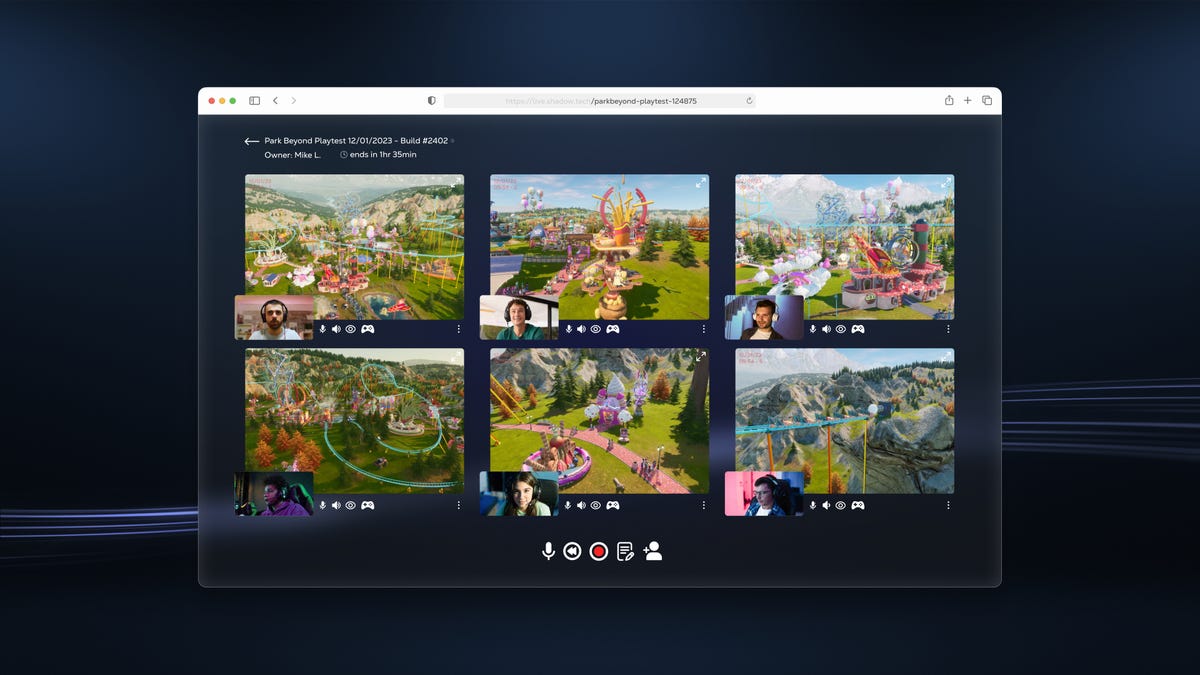 Why You Can Trust CNET
Why You Can Trust CNET Shadow Brings Its Cloud PCs to Creatives
Shadow for Makers will let you subscribe to cloud-based systems for photo, video and 3D editing, and more.

Shadow Echo, which allows game developers to monitor and receive feedback from multiple test sessions simultaneously.
Blade's reinvention of its Shadow desktop-in-the-cloud service expands it well beyond gaming -- previously with Shadow for Enterprise, and now to Shadow for Makers, a new virtual PC subscription targeted at creatives starting at $59 per month.
Shadow's technology allows you to stream a full PC to almost any lower-powered device, like a phone or Chromebook, as well as Macs, similar to the way cloud gaming works for just games. Because Shadow for Makers is still a full Windows desktop, you can still play (or develop) games on it. It's available starting today.
The company hasn't moved too far from its gaming roots, however, launching two game studio-focused services, too: Virtual Booth, which may eventually be the installation-free way you try out new games; and Echo Session, a streamlined way for studios to test and get feedback on their games. The latter have been developed in conjunction with Bandai Namco.
Of the four plans launching Wednesday, two will be available in North America (the other two are Europe-only): Spark, which gives you an eight-core slice of an Intel Xeon CPU and the equivalent of an 8GB Nvidia GeForce GTX 1080, along with 12GB RAM and a 256GB solid-state drive for $59 per month; and Zenith, which provides dual eight-core slices of an AMD Epyc CPU with a 20GB Nvidia RTX A4500 (the workstation equivalent of an RTX 3090 Ti) with 16GB RAM and 256GB SSD for $139 per month. Both allow for upgrades to storage, and Zenith will be upgraded to 28GB in the second quarter of this year.
The Spark configuration is suitable for tasks like midrange photo editing that don't require a high-powered graphics card, while the Zenith configuration is better suited for video editing and 3D design. The Xeon and Epyc CPU generations and GTX GPU aren't great for AI acceleration, which has become more mainstream, especially for automating a lot of photo- and video-editing tasks. On the flip side, though, the data centers hosting these servers have much better internet connections than yours, which can be a boon when working collaboratively on video.
Also of note, Virtual Booth brings the game event platform we could have used during the pandemic. It can host up to roughly 100,000 players gaming from the cloud, and will support social media, gamer feedback and Twitch streaming when it launches in the fall.
The best laptops in every category
- Best Laptop for 2023
- Best Windows Laptops
- Best Laptop for College
- Best Laptop for High School Students
- Best Budget Laptop Under $500
- Best Dell Laptops
- Best 15-Inch Work and Gaming Laptops
- Best 2-in-1 Laptop
- Best HP Laptops
- Best Gaming Laptop
- Best Cheap Gaming Laptop Under $1,000
- Best Chromebook: 8 Chromebooks Starting at Under $300

